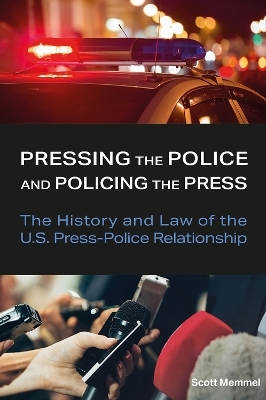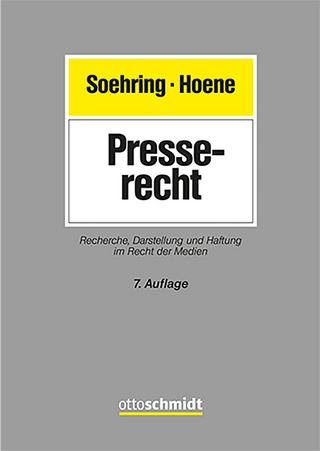
Pressing the Police and Policing the Press
The History and Law of the U.S. Press-Police Relationship
Seiten
2024
University of Missouri Press (Verlag)
978-0-8262-2306-7 (ISBN)
University of Missouri Press (Verlag)
978-0-8262-2306-7 (ISBN)
- Titel z.Zt. nicht lieferbar
- Versandkostenfrei
- Auch auf Rechnung
- Artikel merken
Offers the first book-length study of the history and legal landscape of the press-police relationship. Each chapter focuses on interactions between the press and the police during a particular era, introducing relevant societal context and how both institutions evolved and responded to that context.
In the second half of 2020 and continuing into 2021, protests against racial injustice spread across the United States after the death of George Floyd while in the custody of Minneapolis Police Department officers. Members of the press covered these demonstrations, documenting what transpired and conveying the important messages involved. In so doing, the news media held law enforcement accountable through critical reporting on the actions of the police, with police officers responding in part by intimidating journalists in the field using force and arrest—this in the name of keeping the peace and protecting the public from further harm.
What transpired during this troubled time cast a bright light on the contemporary relationship between the press and police in the United States. The relationship between these two fundamental institutions is, however, a long and complicated one, dating back to colonial British North America. In the mid-19th century, (1830s–1850s) both the press and the police began to take their modern forms, and since then have continued to develop, routinely interacting with each other as journalists and police officers often found themselves responding to the same crimes and events. At times, members of both institutions managed to co-exist or even cooperate and made efforts to help one another, while at other times they butted heads to the point of conflict, the professional boundaries between journalists and police officers seemingly blurred.
As both the press and the police have fallen under deep scrutiny in more modern times, the present moment marks what is, perhaps, an opportune time to focus on the political, economic, social, and technological problems they face. In Pressing the Police and Policing the Press, Scott Memmel offers the first book-length study of the history and legal landscape of the press-police relationship. Each chapter focuses on interactions between the press and the police during a particular era, introducing relevant societal context and how both institutions evolved and responded to that context. Memmel concludes his study with recommendations on how, going forward, the press and the police might work together to tackle some of the similar issues they face and better serve the public.
In the second half of 2020 and continuing into 2021, protests against racial injustice spread across the United States after the death of George Floyd while in the custody of Minneapolis Police Department officers. Members of the press covered these demonstrations, documenting what transpired and conveying the important messages involved. In so doing, the news media held law enforcement accountable through critical reporting on the actions of the police, with police officers responding in part by intimidating journalists in the field using force and arrest—this in the name of keeping the peace and protecting the public from further harm.
What transpired during this troubled time cast a bright light on the contemporary relationship between the press and police in the United States. The relationship between these two fundamental institutions is, however, a long and complicated one, dating back to colonial British North America. In the mid-19th century, (1830s–1850s) both the press and the police began to take their modern forms, and since then have continued to develop, routinely interacting with each other as journalists and police officers often found themselves responding to the same crimes and events. At times, members of both institutions managed to co-exist or even cooperate and made efforts to help one another, while at other times they butted heads to the point of conflict, the professional boundaries between journalists and police officers seemingly blurred.
As both the press and the police have fallen under deep scrutiny in more modern times, the present moment marks what is, perhaps, an opportune time to focus on the political, economic, social, and technological problems they face. In Pressing the Police and Policing the Press, Scott Memmel offers the first book-length study of the history and legal landscape of the press-police relationship. Each chapter focuses on interactions between the press and the police during a particular era, introducing relevant societal context and how both institutions evolved and responded to that context. Memmel concludes his study with recommendations on how, going forward, the press and the police might work together to tackle some of the similar issues they face and better serve the public.
Scott Memmel, Ph.D., is Adjunct Professor at the Marquette University Diederich College of Communication and the recipient of the 2021 Nafziger-White-Salwen Dissertation Award, the highest honor bestowed by the Association for Education in Journalism and Mass Communication for student scholarship for his Ph.D. dissertation. In 2020 he also received the Ralph D. Casey Dissertation Research Award from the University of Minnesota Hubbard School of Journalism and Mass Communication. He lives in Brookfield, Wisconsin.
| Erscheint lt. Verlag | 30.6.2024 |
|---|---|
| Reihe/Serie | Journalism in Perspective |
| Verlagsort | Missouri |
| Sprache | englisch |
| Maße | 152 x 229 mm |
| Gewicht | 680 g |
| Themenwelt | Recht / Steuern ► EU / Internationales Recht |
| Recht / Steuern ► Privatrecht / Bürgerliches Recht ► Medienrecht | |
| Recht / Steuern ► Strafrecht ► Kriminologie | |
| Sozialwissenschaften ► Kommunikation / Medien ► Journalistik | |
| Sozialwissenschaften ► Kommunikation / Medien ► Medienwissenschaft | |
| ISBN-10 | 0-8262-2306-0 / 0826223060 |
| ISBN-13 | 978-0-8262-2306-7 / 9780826223067 |
| Zustand | Neuware |
| Informationen gemäß Produktsicherheitsverordnung (GPSR) | |
| Haben Sie eine Frage zum Produkt? |
Mehr entdecken
aus dem Bereich
aus dem Bereich
Recherche, Darstellung und Haftung im Recht der Medien
Buch | Hardcover (2024)
Verlag Dr. Otto Schmidt KG
CHF 179,95
für Studium, Fachanwaltsausbildung und Praxis
Buch | Softcover (2023)
C.H.Beck (Verlag)
CHF 109,95


